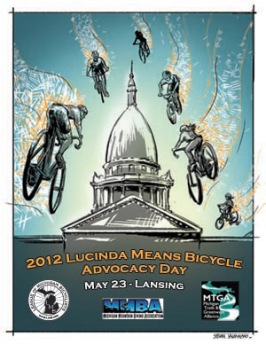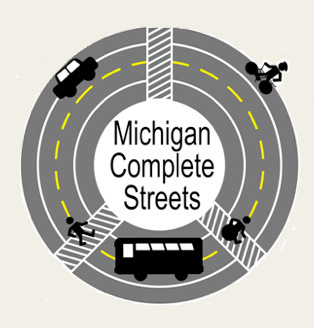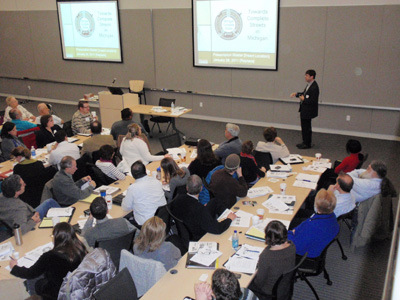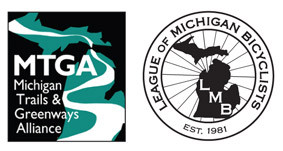You are currently browsing the tag archive for the ‘Michigan Trails and Greenways Alliance’ tag.
Stand up for Complete Streets and the preservation of non-motorized funding at the 2012 Lucinda Means Bicycle Advocacy Day on May 23rd.
Bicyclists and Complete Streets supporters will meet with members of the Michigan Legislator on May 23rd at the State Capitol to advance legislative priorities aimed to make Michigan a more bicycle-friendly state. The event will be hosted by the League of Michigan Bicyclists, Michigan Trails and Greenways Alliance and Michigan Mountain Biking Association. All non-motorized transportation advocates are encouraged to participate.
Their Advocacy Agenda (PDF) includes a number of items such as establishing vulnerable roadway user designations for bicyclists, pedestrians and wheelchair users to create enhanced penalties for drivers who injure or kill a vulnerable roadway user. Advancing bikes-on-trains is another top priority. Roll-on bike service would allow cyclists to take bicycles on-board Michigan Amtrak trains, making multi-modal travel easier in Michigan. This would extend Complete Streets principles of connectivity further than a communities geographic boundaries by linking local bicycle networks and passenger rail service.
Also included in the Advocacy Day agenda are a few bills that are raising the eyebrows of Complete Streets advocates across the state. SB 921 (Ouiment) and HB 5304 (Jansen) were both recently introduced as part of Governor Snyder’s transportation funding reform proposals. Language in these bills, needlessly eliminates the Michigan Complete Streets Advisory Council (MCSAC). The Council, comprised of representatives from 18 statewide government and non-government stakeholder agencies, was created as a result of Public Act 135 of 2010. It is charged with providing education and advice to the State Transportation Commission (STC), county road commissions, municipalities, interest groups, and the public on the development, implementation, and coordination of Complete Streets policies.
To date, the MCSAC has focused its efforts solely on drafting recommendations for the STC regarding the statewide policy for MDOT. As a result, little guidance has been provided to local units of government across the state.
While Michigan leads the nation with the most adopted Complete Streets ordinances and resolutions (over 70 in total), many communities are still hesitant to advance Complete Streets until the MCSAC provides further recommendations. The MCSAC provides valuable oversight and guidance for the effective implementation of Complete Streets throughout the state. Dissolving the MCSAC will create an unfortunate void for communities seeking to make their roads and streets safer for all users. The collective expertise of MCSAC should continue to be utilized as MDOT and local communities work to implement the finalized policy.
Another bill of concern is HB 5303, which removes a funding requirement from Act 51 that obligates communities and road agencies to spend a minimum of 1% of their transportation funding on essential non-motorized transportation projects.
Worse yet, HB 5303 includes provisions that reward funding to road agencies based on the number of Vehicle Miles Traveled (VMT) under their jurisdiction. This creates disincentives for investments in alternative transportation options such public transit systems and bicycle networks.
The bill penalizes communities and road agencies for making systemic improvements like “road diets,” a popular technique that reduces the number of travel lanes on roads designed to carry more vehicle traffic than they do in reality. A common “road diet” improvement converts four-lane roads that have lower traffic volumes into two-lane roads that also include center turn lanes and additional safety features such as bike lanes, creating new transportation options without causing additional congestion.
You can learn more about these issues and register for the 2012 Lucinda Means Bicycle Advocacy Day at www.LMB.org/advocacyday.
In response to the successful passage of Michigan’s Complete Streets legislation, and increasing demand from interested communities and organizations, the Healthy Kids, Healthy Michigan (HKHM) Coalition, Michigan Department of Community Health (MDCH), and Michigan Trails and Greenways Alliance (MTGA) partnered to develop the Complete Streets Institute.
The Complete Streets Institute is a comprehensive and standardized 5‐module training program designed to increase awareness of complete streets principles, support local advocacy efforts, and provide practical, realistic instructions and techniques to help communities create, adopt, and implement Complete Streets policies and projects. The 5‐module Complete Streets Institute training curriculum was designed to cover all aspects Complete Streets, from introduction of the concept (Module 1) to design applications in your community (Module 5). You pick the modules YOUR community needs to move ahead with success. See the PDF below for more details.
 On Friday, January 28, the Michigan Department of Community Health and Michigan Trails and Greenways Alliance launched the Complete Streets Institute. The Complete Streets Institute is a 5-module training series on Complete Streets spanning the basics of how to implementing projects. One hundred trainers, including bike, disabilities, and trail advocates, community officials, county health department staff, MSU Extension specialists, and transportation planners and engineers converged upon Lansing to receive a specialized, day-long training.
On Friday, January 28, the Michigan Department of Community Health and Michigan Trails and Greenways Alliance launched the Complete Streets Institute. The Complete Streets Institute is a 5-module training series on Complete Streets spanning the basics of how to implementing projects. One hundred trainers, including bike, disabilities, and trail advocates, community officials, county health department staff, MSU Extension specialists, and transportation planners and engineers converged upon Lansing to receive a specialized, day-long training.
 Brad Strader of LSL Planning presented the introductory and influencing policy modules, while Nancy Krupiarz of Michigan Trails and Greenways Alliance presented the stakeholder engagement module. The 100 trainers plan to take the information back to their constituents and jurisdictions. Several agencies and organizations will be launching Complete Streets Institute trainings across the state in the coming months. Stay tuned for dates and a location near you! For information about the Complete Streets Institute or trainers, please contact Holly Madill, MDCH Complete Streets Project Coordinator, at [email protected] or (517) 335-8372.
Brad Strader of LSL Planning presented the introductory and influencing policy modules, while Nancy Krupiarz of Michigan Trails and Greenways Alliance presented the stakeholder engagement module. The 100 trainers plan to take the information back to their constituents and jurisdictions. Several agencies and organizations will be launching Complete Streets Institute trainings across the state in the coming months. Stay tuned for dates and a location near you! For information about the Complete Streets Institute or trainers, please contact Holly Madill, MDCH Complete Streets Project Coordinator, at [email protected] or (517) 335-8372.
To date and our knowledge, 26 Michigan communities have passed Complete Streets policies (resolutions or ordinances), the most in the nation. If the population of all of those communities is added up, over 2,194,607 residents, or 22% of the state’s population, live under local Complete Streets policies that seek to provide its residents with transportation choices, more opportunities for physical activity, and a vibrant community.
| Module Title | Description |
| 1-Overview of Complete Streets | This module defines Complete Streets and explains its importance, history, and benefits, as well as its relationship to other associated topics. |
| 2-Stakeholder Engagement
|
This module introduces the various stakeholders of Complete Streets, explains how to work through a coalition to effect policy and projects, and provides messaging and communication tools and tips. |
| 3-Influencing Policy |
This module provides the tools needed to assess a community’s readiness for Complete Streets policies and the steps a community would take to implement them. In addition, the module defines and explains the policy-making processes and stakeholders, and Complete Streets laws. |
| 4-Complete Streets Planning and Regulations | This module explains policy implementation tools such as planning processes, policies, and regulations. |
| 5-Complete Streets Applications and Design | This module explains the design elements and various treatments/applications used to accomplish Complete Streets policy implementation (sidewalks, bike paths, transit stops, road diets, etc.) through project design. |
 Today, the League of Michigan Bicyclists (LMB) and Michigan Trails and Greenways Alliance (MTGA) submitted a letter opposing a proposed amendment to HB 6151 and 6152 by the County Road Association of Michigan (CRAM). As these Complete Streets bills reach the homestretch of the legislative process, CRAM is seizing this opportunity to attempt changes to Act 51, Section 10k, the only guaranteed source of funding for nonmotorized infrastructure in the state transportation budget.
Today, the League of Michigan Bicyclists (LMB) and Michigan Trails and Greenways Alliance (MTGA) submitted a letter opposing a proposed amendment to HB 6151 and 6152 by the County Road Association of Michigan (CRAM). As these Complete Streets bills reach the homestretch of the legislative process, CRAM is seizing this opportunity to attempt changes to Act 51, Section 10k, the only guaranteed source of funding for nonmotorized infrastructure in the state transportation budget.
As it currently stands, Section 10k requires (as it has for the past 32 years) that 1% of all surface transportation funding in the state transportation budget be allocated to nonmotorized transportation. Eligible projects can include sidewalks in cities and villages, bike lanes, widened shoulders, trails within the road right of way, campaigns for the safety of cyclists on Michigan roads and public education efforts in all jurisdiction that are eligible for transportation funding. This is not a hardship as jurisdictions have ten years in which to accumulate and spend these funds. It should also be noted that nonmotorized facilities, such as bike lanes and wide shoulders, have been proven to extend the life of our roads by protecting their edges.
While CRAM has made it clear from day one that they oppose these bills, they have chosen not to express their opposition publicly and instead have stated both in the House and Senate that they support these bills “in concept only.” Their last-minute attempt to tack on an unrelated issue to bills that have seen overwhelming nonpartisan support in both the House and Senate as well as the general public is certainly unfortunate to say the least.
HB 6151 and 6152 will soon be up for a vote on the Senate floor, possibly as soon as tomorrow, July 28th. We are asking all Complete Streets supporters to voice support for these bills to your State Senator and express opposition to CRAM’s efforts to eliminate mandatory nonmotorized funding in Michigan. A few bulleted concerns regarding CRAM’s ammendment are below and the letter of opposition by LMB and MTGA can be read here.
Concerns with CRAM Amendment:
- MDOT does not have the ability to leverage the large variety of different funding sources to satisfy the 1% requirement making it no longer a level playing field.
- Creates an environment of “haves, and have nots” among local road agencies. Some communities may not have the capacity, know how, or resources to leverage other sources of funding.
- Utilization of other funding sources may create challenges associated with auditing, reporting enforcement of compliance by MDOT and the Michigan Department of Treasury.
- Utilizing other sources may create issues associated with ensuring the funding is being used for appropriate non-motorized facilities.
- Current nonmotorized funding needs far exceed the current 1% requirement which means they should be using all other available funds to match or leverage the 10k investment - NOT replace it!
 Registration is now closed for the League of Michigan Bicyclists, Michigan Mountain Biking Association and Michigan Trails and Greenways Alliance 2010 Lucinda Means Advocacy Day on May 26. 85 bicyclists from across the state will be meeting in person with their representatives to voice their support for Complete Streets legislation, Michigan House Bills 6151 and 6152. If you’re unable to attend the event, you can still help out fellow bicyclists by participating in our virtual lobbying day.
Registration is now closed for the League of Michigan Bicyclists, Michigan Mountain Biking Association and Michigan Trails and Greenways Alliance 2010 Lucinda Means Advocacy Day on May 26. 85 bicyclists from across the state will be meeting in person with their representatives to voice their support for Complete Streets legislation, Michigan House Bills 6151 and 6152. If you’re unable to attend the event, you can still help out fellow bicyclists by participating in our virtual lobbying day.
GUIDE TO VIRTUAL LOBBYING:
Step 1
Sign our predrafted email to House Transportation Committee Members expressing your support for HB 6151 and 6152. Please put your first and last name in the “Name” field. You are also encouraged to personalize the message using the “Personal Statement” field. The email form can be found at http://citizenspeak.org/node/2032 (this link has been disabled).
Step 2
Call your representative – the combination of face-to-face and phone communications in support of the bills will demonstrate a strong and unified Michigan voice. By putting in your 10-digit zip code at www.votesmart.org, you can determine who your legislators are and find their phone numbers.
We encourage you to use the talking points below to send your own alert encouraging your members to participate.
TALKING POINTS:
- Complete Streets ensure that our roads are safe, more livable, and accessible to people of all ages and abilities.
- Complete Streets boosts the economy by increasing residential property values and facilitating retail and commercial development.
- Complete Streets improve safety and reduce crashes by providing pedestrian and bicycling infrastructure, such as safe crossings, sidewalks or on-road bicycle lanes.
- Complete Streets promote public health by making it safe and convenient for children and families to incorporate physical activity into their daily lives.
KEY FACTS:
- The 2001 National Household Transportation Survey reported that 50 percent of all trips in metropolitan areas are 3 miles or less, and 28 percent are 1 mile or less.
- Complete Streets policies have been adopted in 21 states, including Illinois, Minnesota and Wisconsin.
- A study in Houston found that 3 out of 5 disabled and elderly citizens do not have sidewalks between their home and the nearest bus stop.
For more specific information, please download our Complete Streets fact sheet. The National Complete Streets Coalition site also has great fact sheets by issue area if you need additional resources.















